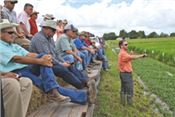|
Diseases, Insects, Weeds Are Concerns As Rice Season Progresses

Matt Osterholt, an LSU graduate student in weed science, talks about his work studying possible effects of crop oils on tank-mixed herbicides.
The presentation was made at the Acadia Parish rice field day held at the South Farm of the LSU
AgCenter H. Rouse Caffey Rice Research Station near Crowley.
Photos by Bruce Schultz/LSU AgCenter
CROWLEY, LA.
As the 2018 rice crop progresses into the heading stage, farmers should be looking out for diseases and insects, but weed control should also remain a concern, LSU AgCenter scientists advised at the Acadia rice field day on June 12.
AgCenter plant pathologist Don Groth said he has received a few reports of blast and sheath blight, although the diseases are usually more prevalent earlier in the growing season.
With moisture from rainfall, sheath blight “will move very quickly once the rice gets into the reproductive stage,” he said
The new Provisia variety is more susceptible to blast, Groth added.
A new fungicide, Amistar Top, has activity against blast as well as sheath blight, and it is labeled for second-crop applications, Groth said.
AgCenter entomologist Blake Wilson said rice will be more susceptible to stink bugs in the first two weeks of heading.
Pyrethroids are still effective against stink bugs in Louisiana, but farmers in Texas have reported reduced control, probably because the insecticide is widely used on grain sorghum there also.
A new product, Tenchu, has good stink bug control, Wilson said.
AgCenter rice extension specialist Dustin Harrell said farmers growing a second crop should consider tank mixing the plant hormone gibberellic acid with a stink bug insecticide to boost the second-crop yield.
Nighttime temperatures will be critical in the next few weeks. Higher-than-usual night temperatures will interfere with flowering and pollination, but the long-range forecast does not project above-average night temperatures, Harrell said.
Sam Rustom, a graduate student in weed science, said the herbicide Loyant is showing good results on cattails and other aquatic weeds.
Flooding rice on time is essential for good weed control. “The longer you wait to establish the flood, the more you’re going to lose with grass and sedge control,” Rustom said.
AgCenter weed scientist Eric Webster said he is testing Loyant to see what varieties show injury from the herbicide. Early testing appears to show that hybrids are affected more than conventional varieties.
Ben McKnight, a post-doctoral weed science scientist, said benzobicyclon is proving to be a good aquatic weed herbicide, and it should be considered by rice farmers who also produce crawfish on fields that are flooded for most of the year.
The herbicide is good on pickerelweed and burrhead. “It’s probably one of the best materials on duck salad I’ve ever seen,” McKnight said.
Matt Osterholt, a graduate student in weed science, said he is testing the herbicide RiceOne, and graduate student Conner Webster said he is testing different crop oils to see if they affect the antagonism of the Provisia herbicide when it is mixed with other herbicides.
AgCenter rice breeder Adam Famoso urged farmers to be patient with Provisia as the new variety will be followed with superior versions that have higher yield potential and better disease resistance.
The gene for Cercospora resistance has been identified, and that will help in the development of all rice varieties, Famoso said.
AgCenter soybean specialist Todd Spivey said he suspected past winter’s cold weather would suppress red-banded stink bugs. “That tends to be the case so far,” he said.
Intensive scouting for diseases should be started for late-planted soybean, Spivey said.
Also at the field day, Ron Levy of the Louisiana Master Farmer Program said Phase 1 training will be held at the LSU AgCenter H. Rouse Caffey Rice Research Station on June 26, and attendance of the Rice Research Station field day the following day will satisfy the Phase 2 requirement.
Two other rice field days remain.
One July 16, the St. Landry Parish rice field day will be held at the Charlie Fontenot Farm near Palmetto. The northeast Louisiana rice field day will be held at the Colvin Farm near Rayville on July 18. ∆

Adam Famoso, far left, gives an overview of his rice breeding program at the Acadia Parish rice field day, attended by more than 75 people.
|
|